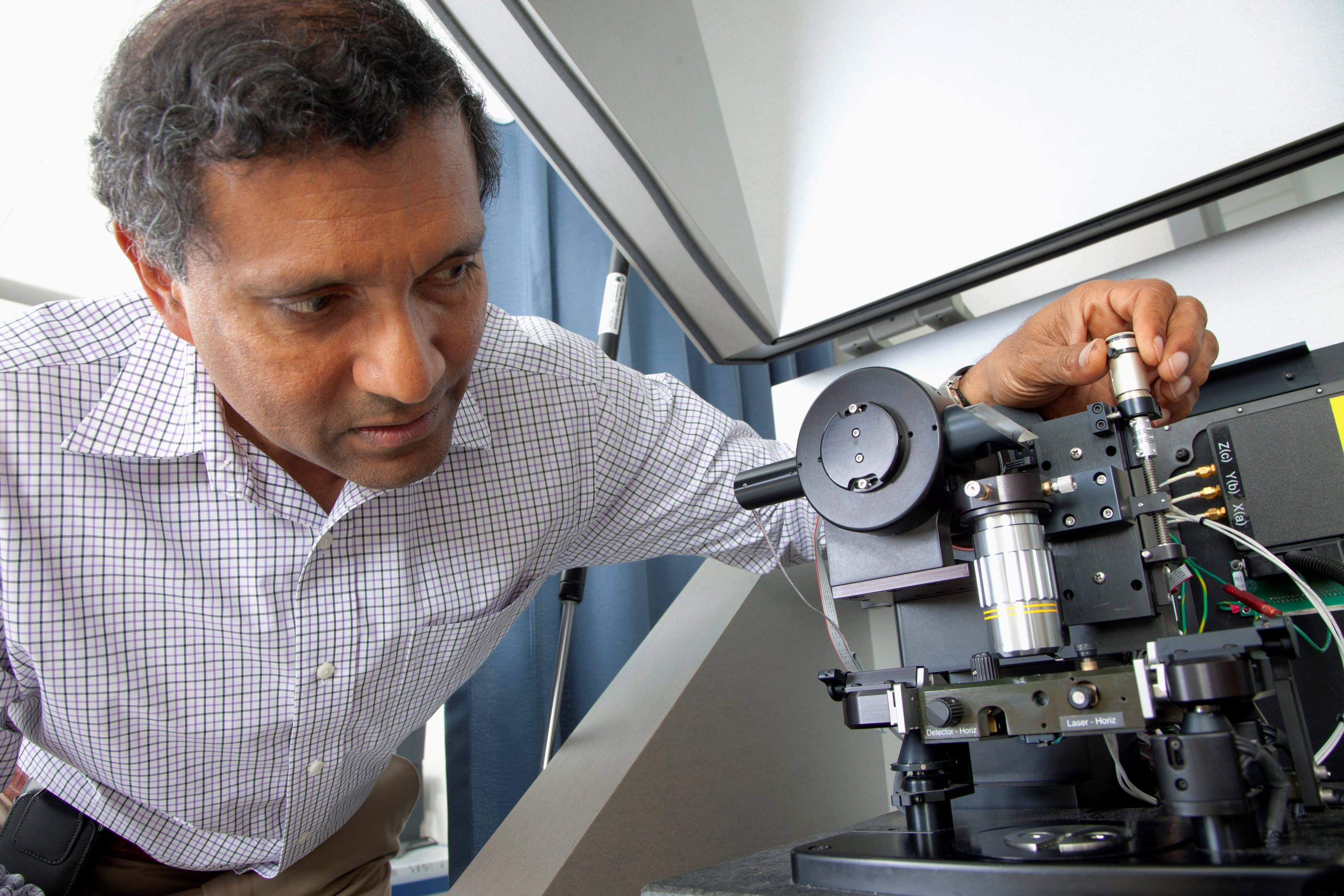UCI’s Kumar Wickramasinghe is named a fellow of the Royal Society
Accomplished engineer is recognized for contributions to nanotechnology, microscopy

Irvine, Calif., April 17, 2019 – H. Kumar Wickramasinghe, UCI Distinguished Professor and Nicolaos G. & Sue Curtis Alexopoulos Presidential Chair in Electrical Engineering & Computer Science, has been elected a fellow by the Royal Society of London for Improving Natural Knowledge.
“I am thrilled and humbled to have been elected a fellow of the Royal Society, the oldest science academy in the world, which has elected to its fellowship most of the scientific giants of all time,” said Wickramasinghe, a highly decorated academic leader who holds joint appointments in UCI’s biomedical engineering and materials science & engineering departments. “It is rewarding to see organizations with global stature putting the spotlight on the work I have done in my career and especially here at UCI.”
Fellows are elected for life. Past members include Isaac Newton, Christopher Wren, Charles Darwin and Stephen Hawking. Wickramasinghe joins current fellows Jocelyn Bell Burnell, Francis Crick and Tim Berners-Lee.
Other UCI faculty among the Royal Society fellowship, past and present, include Nobel laureate F. Sherwood Rowland, a founding faculty member in the Department of Chemistry; Ricardo Miledi, Distinguished Professor of neurobiology & behavior; and Ian Parker, professor of neurobiology & behavior.
After earning bachelor’s and doctoral degrees in electronic & electrical engineering at King’s College London and University College London, respectively, Wickramasinghe spent a lengthy career at IBM, where he tackled the problem of characterizing computer chips and devices that were rapidly shrinking beyond what could be seen with visible wavelength microscopes.
With more than 100 patents to his name, Wickramasinghe is a pioneer in nanotechnology research and innovation. He led the development of such technologies as the vibrating-mode atomic force microscope, magnetic force microscope, electrostatic force microscope, Kelvin probe force microscope, scanning thermal microscope and apertureless near-field optical microscope. Most of these scanning probe microscopes are now standard instruments for nanoscale characterization.
“Professor Wickramasinghe’s contributions to the field of nanotechnology are being recognized on a global scale with this exceptional achievement of being elected a fellow of the Royal Society,” said Enrique Lavernia, UCI provost and executive vice chancellor. “This honor is yet another recognition of the excellence of our UCI faculty, which include 41 members of the National Academies of Sciences, Engineering, and Medicine, 35 members of the American Academy of Arts & Sciences, nine members of the National Academy of Inventors and four members of the National Academy of Education.”
Since joining UCI in 2006, Wickramasinghe has continued to pursue enhancements to nanoscopic devices and techniques for studying atoms, molecules and chemical bonds, with the goal of one day being able to take movies of the surfaces of these objects. Another major thrust has been to build instruments to improve the understanding of biological processes and enable rapid, point-of-care diagnosis of bacterial and viral infections.
“Essentially, I am a tool builder,” said Wickramasinghe, who’s also the Henry Samueli Endowed Chair in Engineering. “The work I did in the past has impacted many areas of physics and chemistry, and lately I’ve tried to develop instruments that make a difference in biology, healthcare and the life sciences.”
A recipient of the 2014-15 Distinguished Faculty Award for Research from the UCI Academic Senate, Wickramasinghe also is a member of the National Academy of Engineering; an IBM Fellow and a member of the IBM Academy of Technology; and a fellow of the American Physical Society, the Institute of Physics, the Institute of Electrical & Electronics Engineers, the Royal Microscopical Society and the National Academy of Inventors.
Founded in 1660, the Royal Society is the world’s oldest scientific academy in continuous existence and an independent scientific academy of the United Kingdom. The fellowship of the Royal Society comprises more than 1,460 of the most distinguished scientists from the United Kingdom, other Commonwealth countries and the Republic of Ireland, as well as over 170 foreign members.
Wickramasinghe will be formally inducted into the Royal Society in a ceremony in London on July 12.
About the University of California, Irvine: Founded in 1965, UCI is the youngest member of the prestigious Association of American Universities. The campus has produced three Nobel laureates and is known for its academic achievement, premier research, innovation and anteater mascot. Led by Chancellor Howard Gillman, UCI has more than 36,000 students and offers 222 degree programs. It’s located in one of the world’s safest and most economically vibrant communities and is Orange County’s second-largest employer, contributing $5 billion annually to the local economy. For more on UCI, visit www.uci.edu.
Media access: Radio programs/stations may, for a fee, use an on-campus ISDN line to interview UCI faculty and experts, subject to availability and university approval. For more UCI news, visit wp.communications.uci.edu. Additional resources for journalists may be found at communications.uci.edu/for-journalists.


